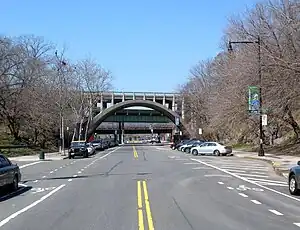Dyckman Street
Dyckman Street (/daɪkmɪn/ DIKE-man), occasionally called West 200th Street, is a street in the Inwood neighborhood of Manhattan, New York City. It is commonly considered to be a crosstown street because it runs from the Hudson River to the Harlem River and intersects Broadway. However, in its true geographical orientation, Dyckman Street runs roughly from north-northwest to south-southeast, and the majority of the street that lies southeast of Broadway runs closer to a north-south direction than east-west.
 North end approaching the Henry Hudson Parkway | |
| Namesake | William Dyckman |
|---|---|
| Owner | City of New York |
| Maintained by | NYCDOT |
| Length | 0.8 mi (1.3 km)[1] |
| Location | Manhattan, New York City |
| West end | |
| Major junctions | |
| East end | |
It is located where West 200th Street would be: the sequence of numbered Manhattan streets in this neighborhood has a gap between West 193rd Street and West 201st Street (with an exception for a very short West 196th Street). As a rustic 18th century valley road lying between Washington Heights and Inwood Hill, it long preceded the comprehensive Manhattan grid plan, which was not applied in this small part of the island. Dyckman Street has for many years been one of the major shopping streets in the Inwood section, and many consider it the border between Washington Heights and Inwood.
Name
Dyckman Street is named for the Dutch farmer William Dyckman, whose family owned over 250 acres (11,000,000 sq ft) of farmland in the area;[2] the Dyckman Farmhouse, located nearby at the corner of Broadway and 204th Street, was built by William Dyckman in 1784 and is the oldest remaining farmhouse in Manhattan.[3]
Route
From its northwesternmost point at the Hudson riverbank, Dyckman Street extends southeast past the Henry Hudson Parkway. From there, it continues southeast until it intersects Broadway, where it turns in a more southward direction until it merges with Tenth Avenue to form the northernmost end of the Harlem River Drive. Traffic on Dyckman Street runs in both directions except for a one-block stretch between Broadway and Seaman Avenue, where it runs only northwest (away from Broadway).
The northwestern portion of Dyckman Street separates Inwood Hill Park (to the northeast) from Fort Tryon Park (to the southwest). Additionally, the southeastern portion of Dyckman Street borders the northern tip of Highbridge Park. Bike lanes in Dyckman Street connect the Hudson and Harlem River portions of the Manhattan Waterfront Greenway.
The seismologically active Dyckman Street Fault runs underneath the street.[4][5]
Transportation
The New York City Subway's Dyckman Street station (A train) on the IND Eighth Avenue Line is located at the intersection of Dyckman Street and Broadway. The Dyckman Street station (1 train) on the IRT Broadway–Seventh Avenue Line is located at the intersection of Dyckman Street and Nagle Avenue.[6]
The Tubby Hook ferry operated from the Hudson River foot of the street to New Jersey at various times from the 18th century until 1942.[7][8]
In 2018, the city government installed bike lanes along Dyckman Street, connecting the two parts of the Manhattan Waterfront Greenway. The bike lanes were removed after complaints from local business owners; after a spike in cycling deaths, the city announced plans to reinstall the bike lanes.[9]
In popular culture
The character Pete Campbell on the series Mad Men is a descendant of the Dyckman family, and references to the area of Manhattan his family controlled are made in the show's fourth episode. It is mentioned that the Dyckman family owned a large tract of land north of what is now Central Park.
The character Charlotte Mayhew is said to have had a Dyckman Street accent in J. D. Salinger's "Raise High the Roof Beam, Carpenters."
In Migos's hit song "Versace", Drake rhymes, "Word to New York ’cause the Dyckman and Heights girls are callin' me Papi."
In Fabolous' song "I Miss My Love," Fabolous rhymes, "Met her uptown on Dyckman, aight then, light-skinned."[10]
Dyckman Street is known for their diasporic Dominican communities.
References
- Google (July 4, 2018). "Dyckman Street" (Map). Google Maps. Google. Retrieved July 4, 2018.
- Dyckman House Museum : NYC Parks. Nycgovparks.org. Retrieved on 2013-09-07.
- "DYCKMAN HEIRS GIVE LAND.; Two Lots Added to Park Named in Honor of Ancestor.", The New York Times, February 22, 1917. Accessed October 26, 2007. "The transfer was recorded yesterday of the gift to the City of New York of two lots adjoining the Dyckman House Park at the northwest corner of Broad way and 204th Street."
- "Observations and Tectonic Setting of Historic and Instrumentally Located Earthquakes in the Greater New York City–Philadelphia Area" (PDF). Bulletin of the Seismological Society of America, Vol. 98, No. 4, pp. 1696–1719. August 2008.
- Shahid, Aliyah (March 17, 2011). "Could an earthquake hit New York City? History says yes, but not like 9.0 magnitude Japan earthquake". NY Daily News.
- "Subway Map" (PDF). Metropolitan Transportation Authority. September 2021. Retrieved September 17, 2021.
- Washington Heights history Archived 2010-08-07 at the Wayback Machine Tubby Hook
- "History of Inwood's Dyckman Street Ferry". myinwood.net. 16 February 2015. Retrieved 18 April 2018.
- Barron, James (August 18, 2019). "The People of Central Park West Want Their Parking Spaces (Sorry, Cyclists)". The New York Times. Retrieved August 27, 2019.
- Fabolous - I Miss My Love Lyrics. Genius. Retrieved 4/18/2022.